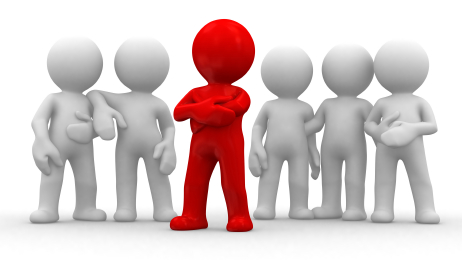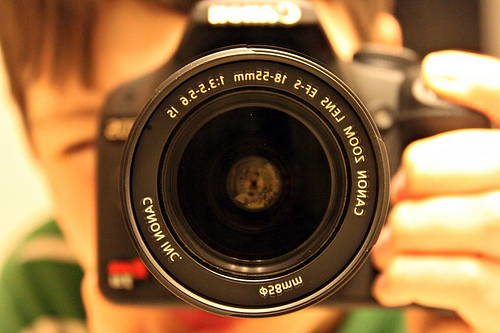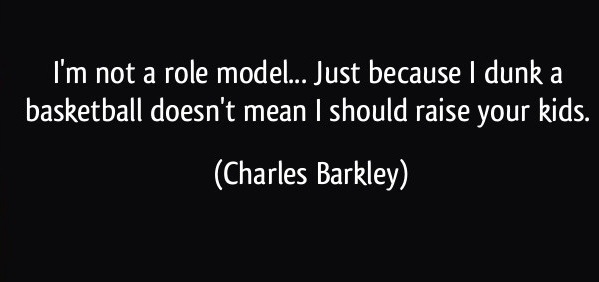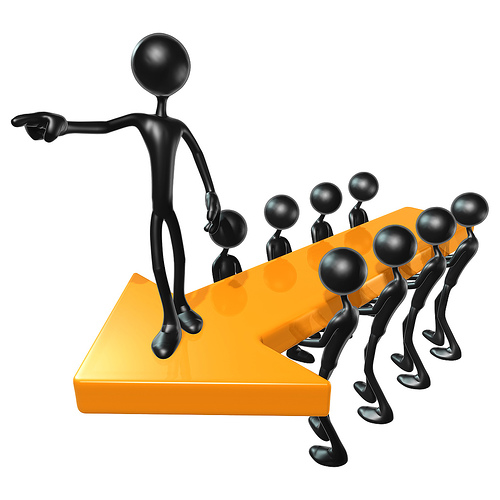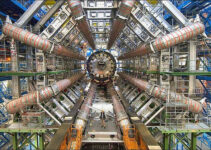Introduction
Who are our role-models? How has society been changing? Who should be our role-models?
First, what are role-models? The dictionary defines it as “a person looked to by others as an example to be imitated.” It is the people we look up to and inspire us (often meant for kids to be like when they grow up). It is the people we not only want to be like but the people who we should be like for a better world. A role-model goes beyond just respect and inspirational figure – i.e. I respect basketball star Kobe Bryant very much since he matured and is my favorite basketball player, but he is not a role-model. Before I get more into that, here’s what I believe has become a society-wise issue.
[Before I get into it, I realize it is a bit depressing who our current role-models have become, but it’s an observation of people & society. On this blog I try to make light out of every issue/situation, but this entry may not be as bright.]
One of the things I have observed over the years is how focus constantly tends to shift away from knowledge & big scale thinking to small scale thinking with no long-term impacts. That paradigm shift has been consistent to the point that few chase knowledge. Technical fields are not respected enough by non-technical. Education way too often gets frowned at. The number of people who don’t read books at all continues to rise decade after decade. It seems as if the definition of reading has changed from reading books to reading facebook & twitter. Or not reading anything at all. These are just impacts on individual level, which is not as damaging in the grand scheme of things.
Scarier than all this is the impact it has had on a societal level. I will focus on some of our biggest modern day role-models, then why they should not be our role-models (example I use is professional athletes — there are some exceptions though as I will mention). I will mention 3 groups of people who instead should be our role-models.
Modern Role Models
The types of people that we consider role models include singers, athletes, actors/actresses, models,. Looks, sexuality, and artificial body altering (botox, plastic surgeries, breast implants, heavy makeup, etc) are rampant alterations in the world we live in today. These changes have made it difficult to distinguish between who or what parts of these celebrities are real or fake. When we look at today’s role models, we see these qualities make up a major component of who they are. Kids, teenagers, even young adults see it daily and strive to be just like that. Materialism, money, wealth trumps ideas, imagination, dreams. When we look on social media, it becomes clear that narcissistic tendencies have taken hold of society globally.
What is clear in all this is the world has changed. When you see people looking up to Miley Cyrus, Kim Kardashian, Justin Bieber, Kanye West, Nicki Minaj, Kylie Jenner, Alex Rodriguez, Donald Trump, Charlie Sheen, many others as role-models, we have a HUGE problem!
Keep in mind that all of these professions can impact the world in positive manners.. Singers can inspire generations of people to look within. Athletes can use their wealth to start charities and contribute to charitable causes for change. Actors can help us dream through different roles of people they can play. More often than not though, these are not role-models. A role-model is somebody we can not only be like but who we WANT to be like, who we should emulate. We have to be able to connect to them on a personal level. How many of us know how LeBron or Taylor Swift are like behind private doors? We know little about their personal lives or their real character. They both seem like great genuine people with big hearts, but that is with cameras focused on them.
How do you emulate somebody that you know only what their team of publicists, public relations firms, and agents want you to know? You don’t even know the real person behind all the facade. We have all heard of well-respected celebrities who were very nice friendly people when in public view but turned out to be ego-maniacs and jerks behind closed doors.
One example – do note this is NOT character assassination because it is a true story. Last year in July 2014, my cousins met NBA basketball superstar Kyrie Irving at Martha’s Vineyard island. He is highly respected by everyone, and I used to truly look up to him. My cousins saw him taking a walk and ran up to him very excited, asking him for an autograph (also gave him option of group photo). Irving rudely says with an attitude “I am busy and with family” and just walks away. If he was worried other kids might start lining up too – that area was hardly crowded and nobody else recognized him. Since that day, I lost respect I had for Kyrie Irving. Guy doesn’t have a few seconds for couple autographs, but worse than that he responds rudely to a few 16 and 17-year old kids? Of course, he has a right to not sign autographs or take a quick selfie, but it was in bad taste. If there were cameras there recording, I guarantee he would have gone out of his way for autographs & taking selfies with zero rudeness. My cousins were disappointed and told me they will never again root for this fake guy. All it took was one moment for the guy to fall permanently from their thoughts, and his true colors to show. I lost all respect for him that day. To this day, people consider Kyrie a role-model, but he is not. Maybe he was before he became famous – money/fame changes people, and I guess he is too big now for the average person.
Moral of the story: Don’t trust what you see, read, or hear from celebrities while in public with cameras pointing at them, media members and personal publicists standing there! It is the private interactions away from cameras that tell you everything (or with a hidden camera, which I feel is somewhat cheap tactic used by entertainment shows like TMZ).
Money as Driving Factor
When you see the amount of public and private sector money being pumped into areas, such as sports, the impact it has on society becomes apparent. Public Relations have an impact that trample over information and has grapple hold on the media globally. While globalization did open up the world along with the Internet and social media, we have unilaterally taken some steps backwards in how information is disseminated. While it has gotten easier to distribute new information, it has become just as easy to spread/manufacture misinformation.
Many, including professional athletes, are seen as bigger role models than scientists, engineers, mathematicians, doctors, and other highly technical areas of study because they’re constant center of focus. It is a very dangerous precedent being set. Clearly, it is also being pushed by massive companies like Nike to sell their products through massive advertisement campaigns.
The driving force behind it all is obviously money (surprise surprise!). Anything or anyone that sells is made to appear a certain way. They have to make millionaire athletes look like an average person to get people to sympathize and buy their products. Marketing is all a psychological game to win over people emotionally. Otherwise, nobody making $40,000 a year would ever buy overcharged products for their kids from product line of someone making millions each year.
When you see players like LeBron James getting lifetime deals worth hundreds of millions of dollars or singers charging millions for a single performance, young kids would want to be just like LeBron or Miley Cyrus rather than enter STEM field & change the world through ideas. They see the money and the advertisements being thrown out there: “If you buy these shoes, you can be as good as Jordan too!”
The impacts are dangerous as kids may decide to act on that by tossing aside education and focusing entirely on sports or something else from early childhood.
Professional Athletes as Role Models
Let’s just focus on the professional athletes example for a brief moment and why they are not role-models. For this example, I will focus on multiple facets of the average professional athlete.
Note that athletes can be role-models but only if you know details about them, their lives, how they think, etc. Most of the time, you don’t know any of that! How can you emulate somebody that you know only what they want you to know?
You can emulate their on-the-court style of play, skills, strategies, etc but nothing off the court (you usually don’t know the guy/girl athlete off the court!). One thing that is hard to understand is athletes being considered role-models by how good they play on the field. Somehow, on-field performance translates to good character off the field in the minds of some people.
Retired basketball star Charles Barkley often said he is not a role model, and it is not his job to be a role-model. We cannot equate what a player does on the field to what he does off the field. Just because someone is good at basketball or baseball or football doesn’t mean he is a great person! Too often kids and other people think how somebody acts in public light is also how they act in private. That is not usually the case.
I fully understand the counter-argument: “But it’s only a very tiny percentage of people who become professional athletes and not a big deal!” True, but when you’re a kid, you don’t know that. Kids get pushed into sports very early, often before they even start school! Parents may see the millions being flung around, and they may want their kids to get set for life through something like sports.
It is easy to say “I will be the next LeBron and Kobe by working out nonstop!” but genetics plays a role too. Nobody wakes up one day, decides to work out for a year, and exits the gym as LeBron James. Genes can be studied to predict who can become a good athlete and who may not (research is still new). As a kid, you don’t realize that most people who attempt to become professional athletes don’t make it, and the years they may have spent daily working on it with all their eggs in one basket may end up being wasted. It is important for kids to focus on as many avenues possible at the same time rather than completely in one single area.
Not only that, but these kids end up paying more attention to the sport they’re playing rather than focusing on education. College athletes put in 40 hours a week on practicing, playing, etc (that does not even include the extensive travel time between games). Many of them also work part-time on the side. Their sacrifice and work-ethics is truly commendable. At the same time, education gets tossed aside on the back burner with their scholarship going down the drain because their main focus is on making it to the big leagues.
Most colleges allow their student-athletes to get accommodations by assigning them special “easy” classes or falsifying grades to keep them eligible. Without overly stereotyping student-athletes, I admit that not every athlete is like this. Kareem Abdul-Jabbar, Tim Duncan, Pau Gasol, many baseball players (baseball players take longer to get to big leagues so more time for education), some athletes are well-educated. These can be good role-models because they made it big while educating themselves in the process. These are the exceptions. Many others may enjoy education, but peer-pressure and stress to succeed at their sport (their life’s dream) often ends them on the path away from education. They put all their eggs in one basket with no alternative. If they don’t make it big or last long in the leagues, then what happens?
Majority (about 60%) of professional athletes go bankrupt the moment they retire from sports because they have no education to rely on down the road. Money comes and goes with reckless spending; when you’re making millions, you see no reason to save up. Keep in mind most of them may not have even completed college, and they may not even have paid attention in High-school. They get taken advantage of by those who know how to manipulate them.
Athletes’ job does rely on their physical prowess rather than developing their intellectuality. Once their physical abilities evaporate, as they bound to, these folks end up in massive trouble once their income stops flowing. They have no degree and often nothing else to lean on!
Flipping the Switch
Education is not something you just wake up one morning and start doing after many years of not caring or avoiding, but it is a lifelong quest. It is a way of thinking, living, and having the desire to learn new things. If you grew up avoiding school much of your life, it is not something you can just flip the switch over night. Going back to college in the late-30’s after 20 years away from school is no simple task for anyone.
Truth is very few involved in the process care. One-and-done rule was implemented where players have to be away from basketball for 1 year, and most opt for college. The intention was said to prepare young men for the big leagues and to cut down on bankruptcy, but it backfired.
One-and-done is problematic because student-athletes go to college for one year with no intention of sticking around, and then they sprint out the door first chance they get offered big money. Why even bother going to college and taking up a scholarship slot if you have no intention of caring about what goes on in the classes? It does not do anyone any good. One-and-done requirement needs to be dropped as it is wasting everyone’s time. They need to go to college for education and not simply to fulfill the one-and-done rule. What’s the point of giving someone a scholarship who half the time doesn’t even show up to class? I want these kids to be educated for life after sports, but if they prefer to directly go to NBA and go broke like every other athlete, what can we do?
When we talk about one-and-done athletes, education is not on the minds of the average student-athlete, the institution of higher learning, the coaches, fans, sports leagues, or anyone affiliated with the organization. It has become a cash-cow for colleges to milk out free money, and colleges go out of their way to make sure their student-athletes stay eligible. Colleges get paid big, NCAA gets paid big, professional sports league get paid big, team owners get paid big, corporations like Nike get paid big, all on the backs of the athletes. In the meantime, we see those same athletes still going broke financially because they are not prepared for life after sports (or often even in life during sports where they often go into massive debts while making millions!).
That is an issue, and it impacts everybody. These, unfortunately, are our modern day role-models that kids want to be just like. Not science, technology, engineering, math, or other technical fields with high levels of technicality and impact. It is not a problem caused by anybody specific, but it is an issue of the mindset. A mindset that makes people narcissistic, greedy, and overly materialistic in their chase for money, wealth, fame, and fortune.
I could go into similar examples of singers, rappers, models, actors, other fields, but I think I made my point. To be a role-model, I believe one has to be accessible to the average child/person and someone with certain qualities. These people above are not accessible, and they have flaws just like anybody (if not more) that no money can solve.
As I mentioned, it is very easy for a person to be one way publicly but entirely different in reality. Agents and public relations folks can truly portray their clients to look like how THEY want to be and what would sell. If we looked at the twitter/facebook pages of these celebrities, it would be very hard to tell what they wrote/posted themselves and what their publicists posted.
So that brings us to final point.
Who Should be Our Role-models?
The best sorts of role-models are those who we know. These include mentors, family members, friends, teachers, professors & advisers, people we know, understand and trust. These are people you know well and those who you know are legit accessible individuals. Everyone might know a few individuals like these, but there are plenty of other potential role-models.
The other sorts of role-models could be those who serve society for the better. These include those we look up to, such as Gandhi, Mother Teresa, Martin Luther King Jr, religious figures such as Buddha, charitable individuals who put their own time/resources aside to help those in need, etc. Essentially, their public & private lives intersect to some degree, and we also have direct writings from many of them (not all). Normally, I don’t consider these as role-models because who can emulate Buddha, Gandhi, or Jesus? I will make an exception depending on what you are trying to draw or learn from these individuals. If you are going in thinking you will turn into Gandhi, forget it! You have a very long road ahead of you – you are better off just being yourself because nobody can BE Gandhi.
Finally, the other great role-models are those who are bringing society forward through ideas and technological advances. Many of these may not be accessible to most people, but these are people that much literature has been written about over the years.. These include scientists like Einstein, Isaac Newton, Stephen Hawking, etc.. Entrepreneurs like Bill Gates, Elon Musk, Steve Jobs, etc.. Engineers like Archimedes, Thomas Edison, Tesla, etc. Even current and recent folks like Bill Nye, Neil deGrasse Tyson, Carl Sagan can be role-models (these are people I look up to). We may not be able to shake their hands since most of them have long passed away, but these are people we know much about – what makes them tick, what is their world view, what ideas inspire them, how they think, their actions, inventions, etc. Their impacts are tangible because they are built more on the platform of ideas than anything else. These are not things a publicist can manufacture or fabricate artificially for the cameras since we have their exact words or lectures to look at.
In the end, be careful what and who you/your kids value in life! I leave you at that.
- My Favorite Books - February 7, 2024
- Review of Carl Sagan’s The Demon-Haunted World - January 31, 2024
- The 75 Greatest Films of All Time - December 22, 2023

